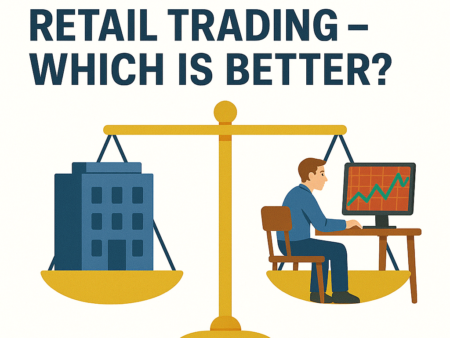Psychology plays a significant role in trading, influencing your overall performance and success. It becomes an even bigger part when you are working with a prop firm, due to the added emotional pressure. Mental discipline enables you to detach from your emotions, allowing you to follow your trading plan.
Traders experience a range of emotions while trading that prompt them to enter or exit the market. Some of these emotions include fear, greed, disappointment and overconfidence. However, entering and exiting positions based on emotions can lead to terrible results. Therefore, it is crucial to master these emotions. The first step to mastering them is analysing some of the triggers.
DIFFERENCE BETWEEN PROP FIRM AND PERSONAL TRADING
Prop firm and personal trading are different in many ways. However, psychology applies to both types of trading.
EMOTIONAL PRESSURE
Prop firm trading has more emotional pressure than personal trading. Prop firm trading involves trading under strict rules and conditions that can put considerable emotional pressure on traders. There is always the pressure to make profits and scale your account. At the same time, the pressure of drawdown limits can cause fear. Meanwhile, traders must always be cautious not to violate any rules that could result in account loss.
On the other hand, there is less pressure with a personal account. Here, there are no rules. You create your own rules, and no one will punish you for not following them.
CAPITAL
Trade The Pool capital
Another difference is the amount of capital available for trading. With a prop firm trading account, you have access to more capital than you would with a personal account. Therefore, the potential returns with prop trading are higher than those of personal trading. However, the more you can earn, the more you need to control your emotions, such as greed.
PROFITS
FTMO profit split
In prop trading, you have to share your profits with the firm. The profit split ranges across different prop firms. Some can be as low as 50/50 while others can be as high as 90/10. Meanwhile, in personal trading, you keep all the profits you make.
RISK MANAGEMENT
Finally, risk management differs between prop firms and personal trading. Prop firms have strict risk management rules that every trader must follow to keep their accounts. Moreover, there is little flexibility on these rules, and they can cause psychological pressure.
On the other hand, personal trading is more relaxed. There are no drawdown limits, unless you set your own. Additionally, you can keep changing your risk management strategies as you grow.
Join FTMO and get funding with a profit split of up to 90%. Join TradeThePool today and get funding with a profit split of up to 80%. Boost your earnings with minimal risk on your part.
PSYCHOLOGICAL TRAPS IN PROP FIRM TRADING
In prop firm trading, many factors can cause a surge in emotions.
CHALLENGES
The first psychological trap is the challenge that allows you to start trading with a prop firm. The challenge comes at a cost and has set objectives. These objectives include a profit target under a limited period. Trading is dynamic and has seasons of excellent and poor performance.
Therefore, it is difficult to say how much a trader can make in a month. Some months are good while others end in losses. That is why professional traders focus more on the process than the money. When the process is good, the money will come in the long run.
Therefore, trading with a set profit target and time limit can evoke a range of emotions. A losing streak can cause disappointment and fear of losing the initial fee. Meanwhile, a winning streak can evoke greed and overconfidence.
BIGGER ACCOUNT BALANCE
Another psychological trap comes when traders win challenges and get funding. Instantly, they have to trade a more significant amount of money than usual. This can lead to a lot of emotional trading. A larger account balance can lead to greed. Imagining how much money you can make with a good winning streak can lead to impulsive trading.
DRAWDOWN LIMITS
Most stock prop firms are strict about risk management. As a result, they set daily and maximum drawdown limits. These limits can create such pressure when trading, especially during a losing streak. As you continue losing, the fear and panic build. These emotions can cause you to abandon your strategy rules and start gambling. The result is usually bad.
SCALING TARGETS
Another psychological trap is the scaling target. Most prop firms promise to increase your account balance if you meet a specific target. For instance, they can scale your account balance each time you make a 10% profit.
HOW TO IMPROVE YOUR TRADING PSYCHOLOGY
Improving your trading psychology can mean better trading results.
BACKTEST STRATEGY
The first tool for improving trading psychology is backtesting. Before applying any strategy in your prop firm account, backtest it to gain confidence. This will ensure that you can weather losing and winning streaks without losing your focus.
KEEP GOOD RECORDS
Another tool is good record-keeping. When you keep good records, you can constantly track your performance. This will help you see when things are going south. If further examination points to poor psychology, you can easily improve. However, without records, it is difficult to see that you are losing track.
KEEP A TRADING JOURNAL
A good journal to record each trade as you enter and exit will ensure you follow your trading plan each day. This means you record the whole process before entering a trade. It reduces impulsive trading driven by emotions.
ADJUST TO DRAWDOWN LIMITS AND MARKET CONDITIONS
It is essential to constantly monitor your drawdown limits as a prop firm trader. This way, you can adjust your position sizes accordingly. If you are nearing your maximum drawdown limit after a losing streak, you can reduce your position sizes to give you time to recover.
At the same time, you can reduce trading activity during volatile market conditions that can trigger emotions.
CONCLUSION
Psychology plays a significant role in successful stock prop trading. Unfortunately, the numerous rules in prop firms result in more emotional pressure than personal trading. However, with the right tools, such as backtesting and record-keeping, traders can learn to keep emotions out of their trading.
Join FTMO or TradeThePool today and become a funded trader with the top prop firms in the industry.











